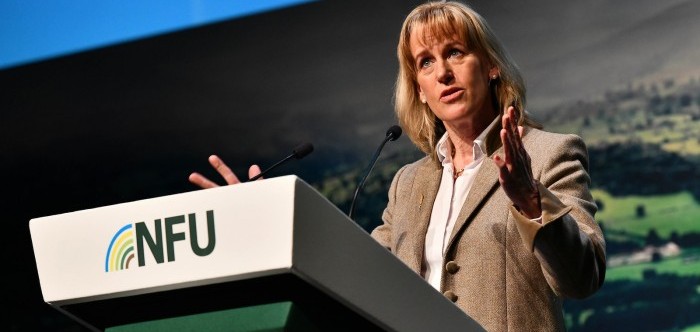If the Government aspires to be a global leader in animal welfare standards, it must apply the same standards to imports, NFU president Minette Batters has insisted.
Responding to the Defra’s new Animal Welfare Action Plan, which sets out a number of new measures to ‘strengthen animal welfare standards and reinforce the UK’s position as a global champion of animal rights’, she said the pig and poultry sectors could be particularly vulnerable to lower standard imports if the issue was not properly addressed.
The plans sets out the intentional to ban cages in poultry and farrowing crates in pigs.
“British farmers are proud to have some of the highest standards of animal welfare in the world and it is clear the government wants to be a global leader in this area,” she said. “However, we want to see the same energy and leadership that is being proposed for protecting endangered species and wildlife crime to be applied to our asks in equivalence in trade.
“I have serious concerns about the government’s intention to raise the bar at home, without any certainty that the same standards will be applied to imports. There are still many practices allowed in countries we are currently negotiating with that are banned here, on welfare grounds.
“For example, it is not uncommon to see journey times for live animals in Australia exceed 24 hours without access to feed or water. In comparison, the government has recently consulted on reducing domestic journey times in the UK to eight hours.
“It’s also important to recognise that two sectors the government has singled out, poultry and pigs, have some of the highest engagement levels in farm assurances schemes, meaning they are managed and audited against robust animal welfare standards.
“Just over a quarter of eggs sold in retail last year were from enriched cages. If this production system were to be banned in this country then there is every prospect that the demand would simply be fulfilled by importing eggs from countries with lower standards.
“If the government is to raise the welfare bar here, it must do so for food imports. It would simply be hypocritical to do otherwise. We cannot have a situation where British farmers adhere to some of the highest standards in the world, only to be undercut by imports that barely meet the lowest rung on the ladder.
The NPA also called for import equivalence if the Government is going to introduce new legislation that will have a profound impact on pig producers.
NPA chief executive Zoe Davies said: “We welcome the clarity this announcement brings on the direction of travel, although the full details on some key policy areas, including the future of farrowing crates, are yet to emerge.
“There is no doubt that some of these proposed measures could have a significant impact on the pig sector, particularly if they are brought in too quickly and do not fully consider the implications.
“This document has been described as the basis for discussion and we will now work closely with Defra to ensure we achieve sensible outcomes for members in all policy areas that will affect them.
“The impact of any new legislation on the competitiveness of the industry must be taken into account. This includes ensuring that equivalent standards apply to pork imports.”




